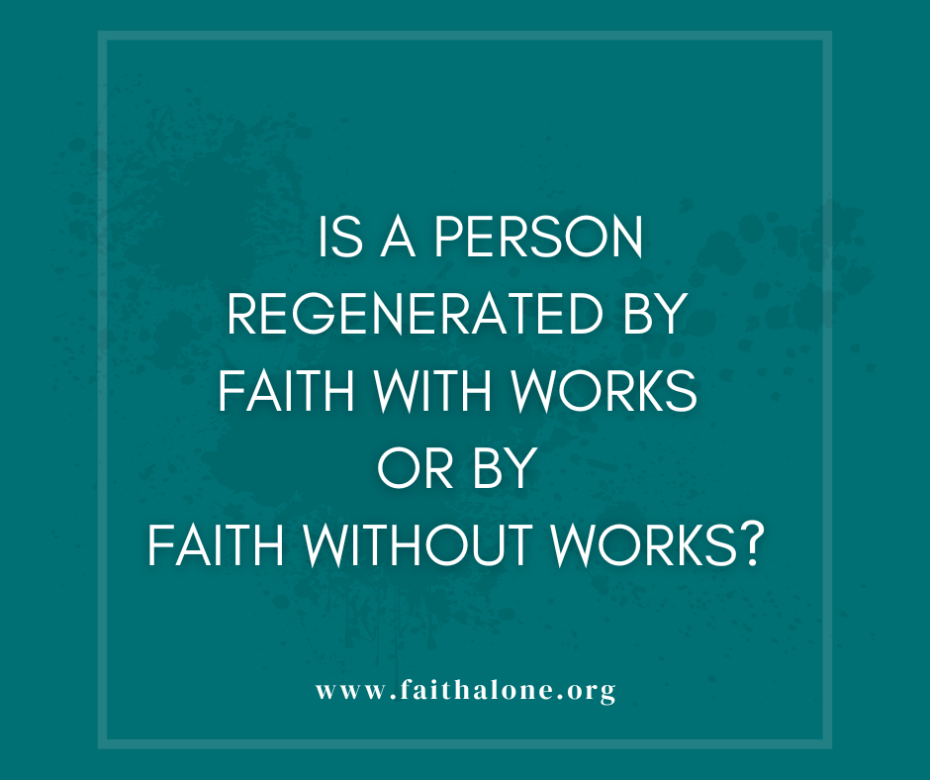Twice in James Chapter 2 we read: “Faith without works is dead” (Jas 2:20, 26). And once we read, “Faith by itself, if it does not have works, is dead” (Jas 2:17). Many commentators focus on the word dead. They wrongly think James means that faith without works is not faith. But dead in this context means unprofitable. Note the expression “What does it profit?” at the start of verse 14 and the end of verse 16. Then James says, “Thus also by itself, if it does not have works, is dead/unprofitable” (Jas 2:17).
See this article for more on the meaning of the expression faith without works is dead.
People do not focus on the first part of that expression. What is faith without works?
James tells us what that expression means several times in Chapter 2.
In verse 17, James says that faith without works is faith “by itself.” In verses 20 and 26 he repeats the expression “faith without works.”
Faith by itself means faith alone. In Latin, that is sola fide.
In verses 12 and 15-16, faith without works refers to people who say but do not do.
In verses 13 and 15-16, it is showing no mercy to the needy.
In verse 14, faith without works is someone believing a Biblical principle yet not having works that put that principle into practice.
If we go back to Chapter 1, James indicates that faith without work is hearing the Word, but not doing (i.e., applying) it (Jas 1:22, 23, 25).
In English and Greek, faith without works is the opposite of faith with works. That is obvious. But rarely is that stated or explained.
Here are a few explanations of James 2:17 from leading commentators on the Epistle of James:
“This verse is just a vivid way of stating that without works faith is no faith at all any more than a corpse is a man” (Adamson, James, p. 124, italics added).
“James does not argue for faith instead of works or works instead of faith or even works above faith, but for faith and works. Both are important and must equally be present or else the other alone is “worthless,” just as body and spirit are each “worthless” when separated from one another” (Davids, James, p. 123).
Adamson argues that faith is not faith until and unless it is combined with works.
Davids suggests that faith alone cannot save (from eternal condemnation). “Both are important and must equally be present.”
They are rejecting the idea of regeneration by faith without works. That is, they are rejecting salvation by faith alone.
Anyone who says that faith without works will not save from eternal condemnation is rejecting the message of John 3:16 and Eph 2:8-9.
Take the illustration in Jas 2:15-16 as a test case. It is easy to see what faith with works would look like in that situation. The believer would give food and clothing to the needy brother or sister.
Believing in Jesus is faith without works. Believing in the Golden Rule is faith without works. Faith without works is faith by itself.
It is possible to believe in Jesus and even to believe in the Golden Rule yet fail to meet the needs of a fellow brother or sister.
The Lord Jesus said that whoever believes in Him has everlasting life (John 3:16). He did not add, but if you do not have works, then you do not have everlasting life.
That is also what Paul said in Eph 2:8-9. We have been saved by grace through faith and apart from works. Faith that is apart from works is faith by itself. Salvation from eternal condemnation cannot simultaneously be by faith with works and by faith apart from works. Those are contradictory concepts.
Here is my thesis: If we gain everlasting life by faith with works, then we do not gain it by faith alone. That should be obvious.
In addition, if we gain everlasting life by faith with works, we do not have that life until we have done the works. That too is obvious.
What works, and for how long? Theoretically, a preacher could say that James was arguing that one good work after believing in Christ makes the faith real and results in regeneration at that moment. Yet I know of no one who says that. They all say that a lifetime of good works must be added to faith in order for someone to gain everlasting life. In that view, you are not born again at a point in time. If you were, then ongoing good works would not be needed. Instead, you would be saved only after you had persevered in a lifetime of loving deeds.
Faith with works is different from faith without works. James makes that quite clear.
How is a person regenerated? Is he regenerated by faith without works? Or is he regenerated by faith with works? One or the other is correct. But not both.
Some preachers try to say both are true. That is nonsense. That’s my point.


